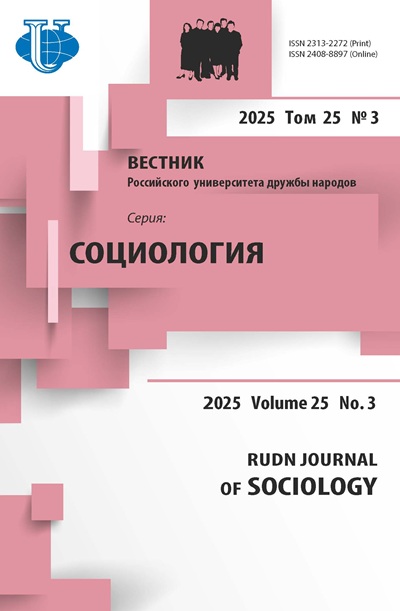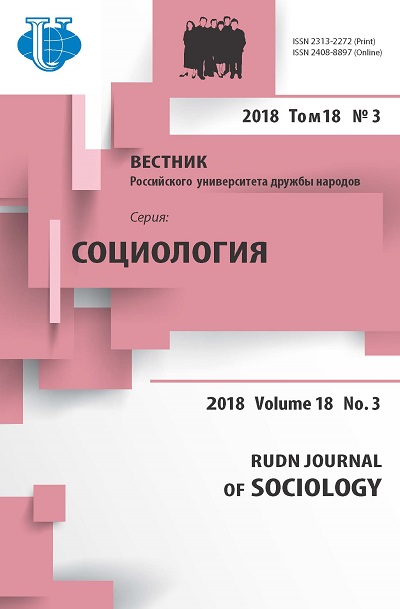ПРОФЕССИОНАЛИЗАЦИЯ ЛИЧНОСТИ В УСЛОВИЯХ ИНФОРМАЦИОННОГО ОБЩЕСТВА: ПРОБЛЕМЫ И ПЕРСПЕКТИВЫ
- Авторы: Цвык В.А.1, Цвык И.В.2
-
Учреждения:
- Российский университет дружбы народов
- Московский авиационный институт
- Выпуск: Том 18, № 3 (2018)
- Страницы: 418-430
- Раздел: Современное общество: актуальные проблемы и перспективы развития
- URL: https://journals.rudn.ru/sociology/article/view/19179
- DOI: https://doi.org/10.22363/2313-2272-2018-18-3-418-430
- ID: 19179
Цитировать
Полный текст
Аннотация
В статье рассматривается проблема профессионализации личности в условиях информационного общества, раскрывается суть профессионализации, выделяются ее этапы, анализируются ее особенности в условиях информатизации образовательного процесса и профессиональной деятельности. Профессионализация понимается авторами как процесс профессионального роста индивида, обучение профессии, т.е. профессиональная самореализация - одна из форм жизненной самореализации. Отмечается, что с всеобщей компьютеризацией социально-культурной действительности, характерной для информационного общества, связаны и процессы информатизации всех форм профессионального становления и развития человека, широкое внедрение информационных технологий в профессионализацию личности. Следствием глобализации процессов информатизации в современном обществе стало изменение не только содержания наших знаний о мире, но и способов их получения, воспроизведения и передачи, что, в конечном счете, существенно повлияло на внутренние структуры личности. Под воздействием новых информационных технологий изменился стиль мышления, способы общения, оценки окружающих и самооценки. Компьютерные технологии раскрывают перед человеком невиданные ранее возможности образовательного роста и профессионального самосовершенствования. Однако, как всякое техническое достижение, компьютерные технологии имеют и негативные последствия, в том числе в сфере профессионального образования - важнейшего этапа профессионализации. В познавательно-мыслительном плане это формирование нелинейного, ассоциативного, мозаичного мышления, переизбыток информации, ослабление творческих начал. В гуманитарном плане информационные технологии механизируют и стандартизируют образовательную деятельность, обезличивают процесс обучения, ослабляя в целом гуманитарные аспекты образования. Таким образом, глобальное и бездумное внедрение информационных технологий в процесс становления профессионала способно породить множество проблем и, в конечном счете, привести к серьезному обеднению профессионализации, которая может превратиться из сложнейшего творческого процесса «созидания» профессионала в примитивную, хоть и обладающую высокой скоростью и большим объемом, передачу информации, в «операционализм» вместо профессионализма.
Об авторах
Владимир Анатольевич Цвык
Российский университет дружбы народов
Email: tsvyk_va@rudn.university
доктор философских наук, декан и заведующий кафедрой этики факультета гуманитарных и социальных наук ул. Миклухо-Маклая, 6, Москва, 117198, Россия
Ирина Вячеславовна Цвык
Московский авиационный институт
Email: tsvykirina@mail.ru
доктор философских наук, профессор кафедры философии Волоколамское шоссе, 4, Москва, 125993, Россия
Список литературы
- Abbott A. The order of professionalization. An empirical analysis. Work and Occupations. 1991; 18 (4).
- Abramov R.N. Rossiiskie menedgery: Sociologichesky analiz stanovleniya professii [Russian Managers: Sociological Analysis of the Profession Development]. Moscow: KomKniga; 2005 (In Russ.).
- Evens J. Reinterpreting professionalism as a discourse of social control and occupational change. Svenson L., Evetts J. (Eds.) Conceptual and Comparative Studies of Continental and Anglo-American Professions. Goteborg: Goteborg University; 2003.
- Evetts J. Short note: The sociology of professional groups. Current Sociology. 2006; 54 (1).
- Forsyth P.B., Danisiewicz T.J. Toward a theory of professionalization. Work and Occupations. 1985; 12 (1).
- Khitrin K.L. Professionalizatsiya socialnyh grupp: traditsii izucheniya i osobennosti protekaniya v sovremennyh usloviyah [Professionalization of social groups: Traditions of study and features of development under the contemporary conditions]. http://elar.urfu.ru/bitstream/10995/31853/ 1/srbu_2015_101.pdf (In Russ.).
- Informatsionnye i kommunikatsionnye tehnologii v obrazovanii [Information and Communication Technologies in Education]. Dendev B. (Ed.). Moscow: UNESCO; 2013 (In Russ.).
- Kuzibetsky A.N. Postindustrialnaya sistema dopolnitelnogo professionalnogo obrazovaniya v informatsionnom obschestve: akmeologicheskii aspekt [Post-industrial system of additional professional education in the information society: An acmeological aspect]. Izvestiya Saratovskogo Universiteta. 2014; 1 (9) (In Russ.).
- Lapshin I.E. Vysshee obrazovanie kak faktor socializatsii sovremennoi molodezhi: eticheskii aspekt [Higher education as a factor of the contemporary youth socialization: An ethical aspect]. RUDN Journal of Philosophy. 2016; 3 (In Russ.).
- Larson M. The Rise of Professionalism: A Sociological Analysis. Berkeley-London: University of California Press; 1977.
- Mansurov V.A., Yurchenko O.V. Konstruirovanie novyh statusnyh pozitsii v protsesse professionalizatsii [Creating new status positions in the course of professionalization]. Modernizatsiya socialnoi struktury rossiiskogo obschestva. Otv. red. Z.T. Golenkova. Moscow: IS RAN; 2008 (In Russ.).
- Mansurov V.A., Yurchenko O.V. Sociologiya professii: istoriya, metodologiya i praktika issledovaniya [Sociology of professions: History, methodology and research]. Sociologicheskie Issledovanija. 2009; 8 (In Russ.).
- McClelland C. The German Experience of Professionalization. Cambridge: Cambridge University Press; 1991.
- Roe A. The Psychology of Occupations. New York; Willey; 1956.
- Romanov P.V., Yarskaya-Smirnova E.R. Tri tipa znaniya v sociologii professii [Three types of knowledge in sociology of professions]. Socialnaya dinamika i transformatsiya professionalnyh grupp v sovremennom obschestve. Mansurov V.A. (Ed.). Moscow; 2007 (In Russ.).
- Savvina O.V. Eticheskoe regulirovanie v vysshem uchebnom zavedenii i usloviya ego effektivnosti [Ethical regulation in a higher educational institution, and the conditions for its effeciency]. Filosofiya i Kultura. 2013; 8 (In Russ.).
- Tsvyk V.A. Nravstvennye tsennosti professionalnoi deyatelnosti [Moral values of professional activities]. Lichnost. Kultura. Obschestvo. 2014; XVI (1-2) (In Russ.).
- Tsvyk V.A., Mukhametzhanova V.S. Ethical basis of professionalism. 3rd International Conference on Arts, Design and Contemporary Education. Atlantis Press; 2017.
- Tsvyk I.V. Kompyuternaya etika i problemy intellektualnoi bezopasnosti [Computer ethics and issues of intellectual security]. RUDN Journal of Philosophy. 2013; 3 (In Russ.).
- Tsvyk I.V. Kompyuternye tehnologii v sovremennom obrazovatelnom protsesse: etichesky aspekt [Computer technologies in the contemporary educational process: An ethical aspect]. RUDN Journal of Philosophy. 2017; 21 (3) (In Russ.).
- Tsvyk V.A. et al. Etika vysshei shkoly [Ethics of Higher Education]. Moscow: RUDN; 2016 (In Russ.).
Дополнительные файлы













